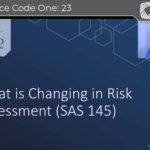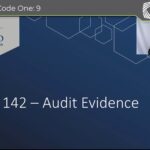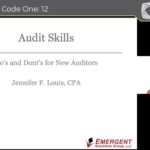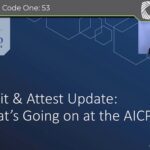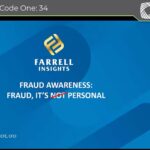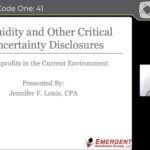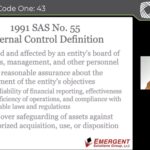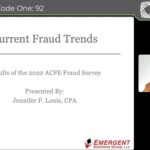SAS 145, Understanding the Entity and Its Environment and Assessing the Risks of Material Misstatement, was issued in October 2021. The audit standard amends AU-C 315 including many changes to address common audit deficiencies. This course will provide an overview of SAS 145 and its changes to AU-C 315.
SAS 142 Effective 2022 (LIAA27/23)
After the reporting suite, the Auditing Standards Board issued another important standard impacting how we perform our audits. With the rise of technology by both auditees and auditors, the concept of audit evidence needed an update. With new definitions and requirements, these standards bring audits into the 21st century. This course will not only look at the changes but how to effectively consider implementation.
Audit Skills: Do’s and Don’ts for New Auditors (LIAA24/23)
Learn the basic skills new staff need to hit the ground running and efficiently complete assigned tasks, including what new auditors are expected to know and do, including the nature, timing, and extent of common audit procedures. Focus on why certain procedures are performed and perform typical procedures. Discussion Leader: Jennifer Louis
AICPA Update (LIAA23/23)
Now that auditors have adopted the new auditor reporting suite, it is time to turn our attention to SAS 142, Audit Evidence, which is effective this year. This course will review the changes driven by SAS 142 before looking further ahead to SAS 143 through 145 to understand their impact on auditing estimates and risk assessment. These standards will be effective in 2023. We will also provide an update on the changes to examination and review engagements under the SSAEs before closing with the proposed changes to quality management. Discussion Leader: Melisa Galasso
How Companies Choose a CFO (LIAA36/23)
The moment Companies choose a CFO arrives at different times and for different reasons depending on the arc of a company’s development and financial planning. Depending on the particulars of a company’s revenue stream, the need for a more finely tuned long-term strategy, a plan for spinning off subsidiaries, a company preparing to go public or just elegantly, efficiently handling the complexities of a growing company can all be reasons for choosing a CFO. In this session find out the details behind these reasons and others as a company begins the process of choosing a CFO. Discussion Leader: Tom Kelly
Fraud Awareness: Fraud – It’s Not Personal. (LIAA22/23)
When does trusting your family hurt your family business? In this Fraud Awareness course, we will focus on the dynamics and culture of the Family Business and the impact fraud can have on the extended family. This course will also explore the current environment involving elder financial exploitation, including why bad actors target the elderly, the vulnerable, or the role the elderly might play in a fraud, including as the perpetrator. Discussion Leader: Ramona Farrell
Liquidity and Other Critical Uncertainty Disclosures of Nonprofits in the Current Environment (LIAA19/23)
The current environment could be having an enormous impact on accounting and financial reporting for all entities, including nonprofits. This course will provide insights into the most critical disclosures related to liquidity, accounting uncertainty, and going concern for nonprofits. Discussion Leader: Jennifer Louis
Critical Internal Control Considerations in the Current Environment (LIAA18/23)
Internal controls are applied within an organization to satisfy objectives related to operations, compliance, and financial reporting. This course will provide practical analysis and tips for how a reporting entity can manage financial reporting risk in an effective and efficient way. Discussion Leader: Jennifer Louis
Current Fraud Trends – Results of the 2022 ACFE Global Fraud Survey (LIAA21/23)
A typical entity will lose 5% of annual revenues to fraud. This course will discuss the trends and fraud schemes that lead to such losses, as well as best practices for preventing and detecting them. Discussion Leader; Jennifer Louis
Thinking Like an Auditor When Preparing Your Financial Statements (LIAA20/23)
External auditors must understand concepts like materiality, reasonableness, and risk of material misstatement. This course will explain how to think like an auditor when preparing your financial statements and related disclosures to achieve fair presentation. Discussion Leader: Jennifer Louis

